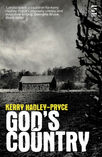Fiction as an Outlet for Melancholy
- Kerry Hadley
- Aug 11, 2021
- 3 min read

I've been reading Bill Psarras' 2018 piece on 'Locating Poetic Objects: Experiencing Poetry into Site through Walking, Sound and Interaction' in which he writes about process of walking, specifically as a way of sensing place, and it struck me that while the physical body 'senses' place what Psarras calls 'the local', a fictional identity, or a writer's identity, through the process of writing fiction is able to communicate with 'the outer'. Effectively, the fiction provides a space for a social construction and conceptualisation of place. The fiction itself acts as an extension of the embodied sensing of place. Psarras (2018, p. 4) quotes Meyrowitz (2005): 'We are here and elsewhere, and thus our experience becomes fused.' He's referring to the geohumanistic turn, but I'm talking about a 'psychogeohumanistic' approach to turning that experience into writing fiction, and fund the idea of what Meyrowitz describes as becoming 'fused' as the connection between psychogeography and flow.
I took the photograph above when walking. It's the aqueduct in Stourbridge. The canal flows above, and below is the River Stour (also called 'The Forgotten River'). This place features In 'God's Country' in a section I wrote perhaps a year ago. It's towards the end of the novel when characters Alison and Guy are walking, searching for Donna who has gone missing. In this section of the novel, Alison begins to experience the place as Guy does. In 'Summer in Algiers', Camus' laments the 'excess of nature's blessings' (1970, p.81) saying that in Algiers 'for a man who has lost his youth, there is no outlet for melancholy' and I thought of this when I was revisiting the text of 'God's Country' and how, in writing the place as fiction, the fiction itself become an outlet for melancholy:
On further, they will have walked along the towpath to where the canal crosses the river on an aquaduct. It’s reshaped, the landscape is, just there. And just there, holding on to the branch of a tree to keep upright, she’ll say they stopped. They’ll have had to, if only to catch their breath. The river beneath them is only just wider than a stream there, but it moves as if being chased, and somehow its proximity to the canal seems to give it a feeling of panic. Like it needs to rush away, or wants to – if it could want, that is. And it falls and rushes in strange lines, like quicksilver. The canal though, the water, it fools you into thinking it’s still. This intersection of water here, with the rushing of the river underneath and the brothy stillness of the canal above is like the past colliding with the present, somehow, or freedom running alongside constraint. And there’s a proper sense of risk. You can feel it. She’ll have been able to, Alison will. It’s hard to explain, that feeling. With the Stour beneath her and the canal alongside, with everything indifferent to her, perhaps she will have been able to smell the way the wood was rotting, or feel the sense of glass in her lungs. Perhaps she’ll have seen the way the earth tessellates, always damp, and perhaps she will have felt the movement of it under the soles of her boots.
And this leads me to the questions I am asking the fiction itself to go about answering. As I revisited this section of the novel, I thought about Psarras' mention of Richard Long's 'A Line Made By Walking', which refers to walking as both a performative act (the act of walking) and a sculpture (the line). Psarras refers to Long's method of using walking as 'a sensory and meditative tool which inscribes mind and body upon the surface. This acts as a reminder of walking itself as the meeting point of art and architecture.' (p. 4) and I'm struck here that my fiction operates in a similar way: 'God's Country' is (are?) my own lines made by, or as a result of, my own psychogeographic walking (and perhaps even living and being) in the Black Country. The lines are the physical manifestation of the contradictions and 'melancholy' of 'being Black Country'. I have to think more about this, of course, but this is a starting point, for sure.









Comments